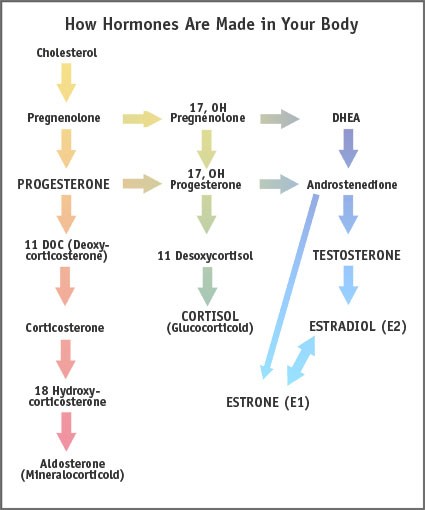Estrogen Dominance – Is It Real?
These hormones are present in our bodies to varying degrees at all times, but only progesterone is readily converted into its sister hormones if needed. Importantly, if we are under a lot of stress and our adrenals are pumping out cortisol, our bodies will take any available progesterone and divert it to meet that demand. If too much progesterone gets diverted for cortisol, as happens when you suffer from adrenal fatigue (take our online Adrenal Health Assessment), there is not enough to make the testosterone needed for a woman’s sexual response — let alone to oppose rising levels of estrogen. No wonder we feel sick, lethargic, and uninterested in sex when we’re under stress!
Insufficient progesterone is hard on our health in other ways because, in addition to reproductive function, all women need normal levels of progesterone to spur new bone growth (and ward off osteoporosis), convert fat into energy, metabolize glucose, and perform many other vital cell functions.
But it’s equally obvious that just adding progesterone isn’t the answer. If stress is creating your hormonal imbalance, adding progesterone will just treat the symptom, not the cause. Because it’s a “moving target,” hormonal balance is never a matter of taking a magic pill. Let’s talk about how to find a solution that works for you.
A woman’s unique path to hormonal balance
In looking at the illustration of the metabolic pathways of progesterone, it’s helpful to think of your endocrine system as a kind of orchestra, and hormonal balance as its music. Each of us has a unique body and biography, so each of us has a unique orchestra and a unique symphony. We all make different demands on our bodies; we all need different kinds of support. Adding any one element to the exclusion of others may make you feel worse, not better. For instance, many women convert progesterone immediately into estrogen; for them, a progesterone supplement will only worsen their imbalance.
There are many women whose bodies, either naturally or due to external factors, produce an abundance of estrogen. I call these patients highly estrogenic, and they are more susceptible to experiencing severe symptoms. They also feel the most dramatic improvement when they add progesterone to their routine.
While genetics have some influence, lifestyle is the single biggest factor in the production and storage of estrogen, progesterone, testosterone, and our other hormones. Our modern diet, filled with refined flour and sugar, simple carbohydrates and artificial ingredients, combined with our lack of exercise, promotes metabolic irregularities that lead to insulin resistance, obesity, digestive problems, and cardiovascular disease, which in turn affect the healthy flow of hormone production shown in the chart above.
Stress plays a major role in estrogen overproduction by triggering an elevated level of cortisol, which interrupts the feedback loop between the brain, pituitary, and the ovaries that regulates hormones. I’m sure most of you have had the experience of skipping a period or two when you are under stress. At the practice we have learned that most women don’t understand that unhappiness is a form of stress. To make the point, I sometimes actually write a patient a prescription that says “Play!”.
